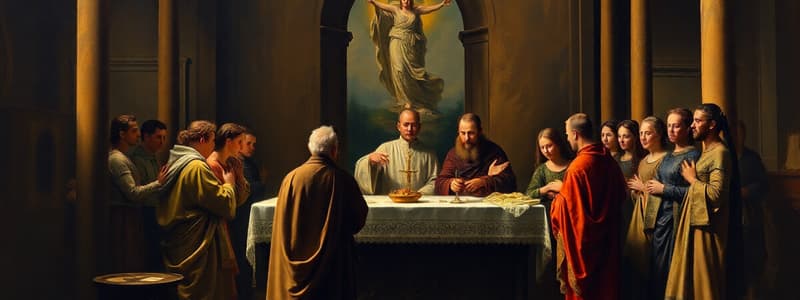Podcast
Questions and Answers
What is the primary function of an altar in a religious context?
What is the primary function of an altar in a religious context?
- To function as the main meeting place for congregational discussions
- To serve as a decorative piece of furniture
- To act as a symbolic connection between the earthly and spiritual realms (correct)
- To hold administrative records of the congregation
Which ritual is commonly associated with alter service in many Christian denominations?
Which ritual is commonly associated with alter service in many Christian denominations?
- Wedding Ceremony
- Eucharist (correct)
- Baptism
- Confession
How do alter services vary between different religious traditions?
How do alter services vary between different religious traditions?
- They are identical in structure and symbolism regardless of denomination.
- They may include different patterns and practices regarding the altar and its objects. (correct)
- They use the same prayers and songs across all cultures.
- They are not influenced by cultural significance.
What role do materials and gestures play in an altar service?
What role do materials and gestures play in an altar service?
Which of the following elements usually occurs in the vicinity of the altar during the service?
Which of the following elements usually occurs in the vicinity of the altar during the service?
What aspect of altar services helps establish a sense of unity among participants?
What aspect of altar services helps establish a sense of unity among participants?
In what ways might the structure and procedure of altar services change over time?
In what ways might the structure and procedure of altar services change over time?
Who typically participates in an altar service?
Who typically participates in an altar service?
Why are prayers and offerings made at the altar?
Why are prayers and offerings made at the altar?
What significance do the ceremonies and language within an altar service hold?
What significance do the ceremonies and language within an altar service hold?
Flashcards
Alter Service
Alter Service
A set of actions performed at an altar, often involving rituals, prayers, and symbolic gestures.
Altar
Altar
A prominent structure in a church or place of worship, serving as a symbolic connection between the earthly and spiritual realms.
Communion (Eucharist)
Communion (Eucharist)
The use of bread and wine as a symbolic representation of the body and blood of Christ, often performed during an alter service.
Offertory
Offertory
Signup and view all the flashcards
Liturgical Practices
Liturgical Practices
Signup and view all the flashcards
Sermon
Sermon
Signup and view all the flashcards
Lord's Prayer
Lord's Prayer
Signup and view all the flashcards
Unity and Belonging
Unity and Belonging
Signup and view all the flashcards
Symbolic Expression
Symbolic Expression
Signup and view all the flashcards
Spiritual Experience and Connection
Spiritual Experience and Connection
Signup and view all the flashcards
Study Notes
Alter Service (Religious Context)
- Alter service refers to the liturgical actions performed at an altar, a prominent structure in a church or similar place of worship.
- These actions are a significant part of many religious traditions, including Christianity, Judaism, and others.
- Alter service often includes specific rituals, prayers, and symbolic gestures.
- The structure and function of an alter service vary widely depending on the specific religious tradition and denomination. Different faiths have varied patterns and practices regarding the altar, the objects on it, and how they are used.
- In some faiths, the altar symbolizes a connection between the earthly and spiritual realms.
- Prayers and offerings at the altar facilitate communication with a higher power.
- In many Christian denominations, the alter service involves actions like communion (or the Eucharist). This typically involves ritual use of bread and wine as symbols of the body and blood of Christ.
- Specific parts of the service, such as the offertory, the sermon, or the Lord's Prayer, often take place near the altar.
- Denominations may hold alter services on specific days or times of the week.
- It is a key element of the worship service, usually involving the clergy, members of the congregation, and other participants.
- The language and ceremonies within an alter service hold deep cultural significance for attendees.
- Alter service and liturgical practices offer insights into the culture, history, and beliefs of the faith group or denomination.
- Alter services foster a sense of unity and belonging for participants.
- An alter service is more than a simple performance of acts; it's a symbolic expression of spiritual beliefs and community connections.
- The symbolic nature of alter service is crucial, as the materials and gestures used represent complex ideas.
- The structure and procedure of the service can evolve over time while remaining aligned with historic practices; this reflects ongoing interpretation and adaptation.
- The roles of those involved (clergy, congregation, musicians) contribute to the experience and outcomes of the alter service.
- The physical altar space and its symbolic objects are designed to create spiritual experiences and deepen a congregation's connection to their faith.
- Alter service may include various forms of music, such as hymns, chants, or instrumental pieces.
- The design, decoration, and maintenance of the altar area reflect the congregation's values and aesthetic preferences.
Studying That Suits You
Use AI to generate personalized quizzes and flashcards to suit your learning preferences.




